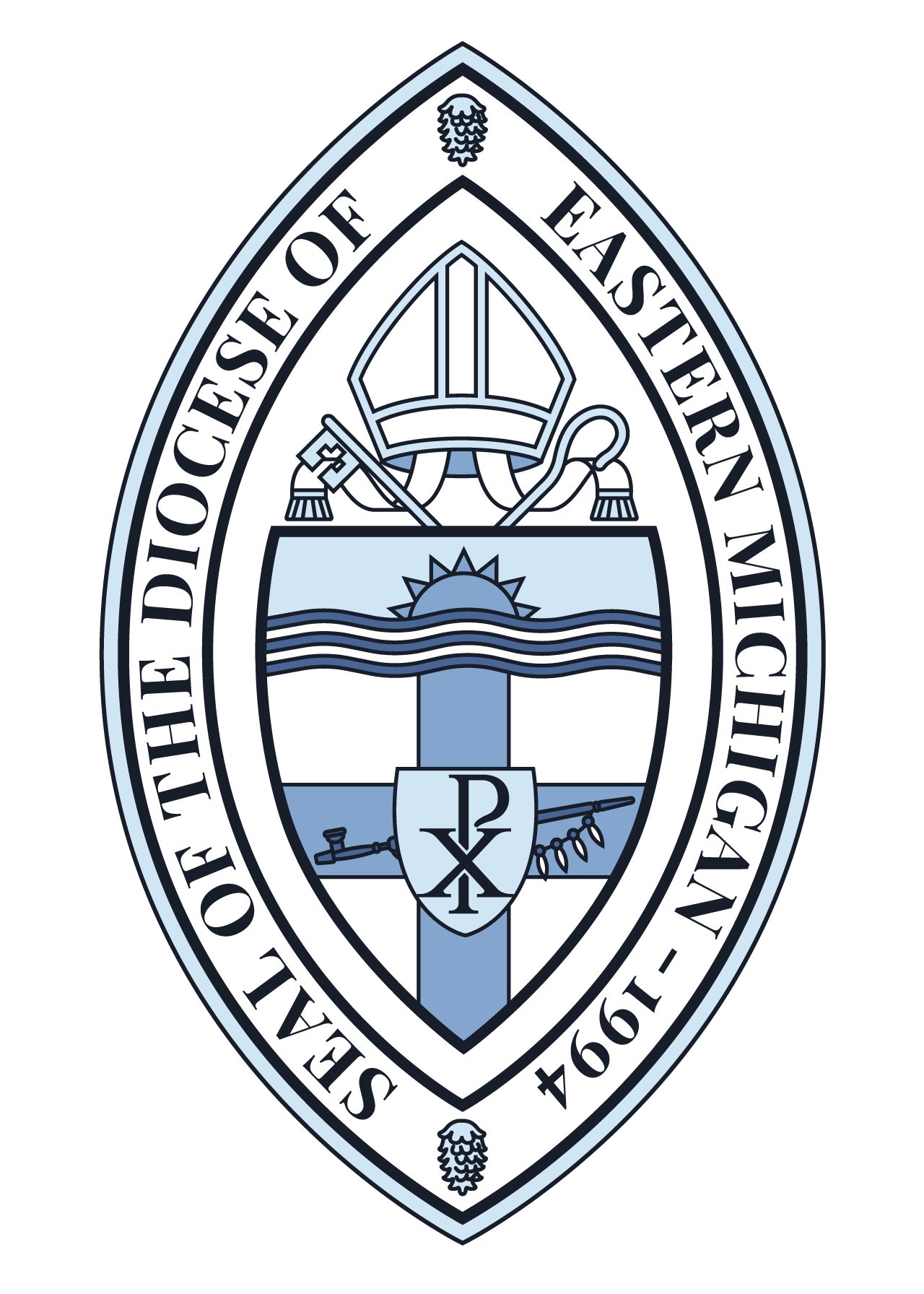Greetings, beloved saints. I want to thank you for the generosity that I have received and the welcome that you have showed me. Many of you have reached out to me. I look forward to meeting each of you.
As we celebrate black history month, I do have a sense of joy and pride in coming to you as the first bishop of color in this part of the world. And I want to thank you the leaders and all of you in your prayers as I join you in this journey.
I’m conscious that we stand on these grounds that have been traveled by many before us, and I want to acknowledge the Ojibwe also known as the Chippewa, the Odawa, and the Potawatomi Indians. And remember that we traveled on this journey on the shoulders of our ancestors.
One on my favorite groups growing up, that I listened to, was Sweet Honey in the Rock. And I am constantly drawn to the depth of their theology. In one of their lyrics, they talk about every child, for each child that is born a morning star rises and sings to the universe who we are.
“We are our grandmother’s prayers; we are our grandfathers dreaming’s. We are the breath of the ancestors. We are the spirits of God. We are mothers of courage, fathers of time, daughters of dust, and sisters of mercy, brothers of love, lovers of life and builders of nations. We are seekers of truth, keepers of faith, makers of peace, wisdom of ages. We are our grandmothers’ prayers; we are our grandfathers dreaming’s. We are the breath of the ancestors. We are the spirit of God. We are one “
Black history month, in a way, is a reminder to us that we remember we are one. We need each other. And I believe the intentionality in recognizing that some groups are forgotten. Like the history of black people, is a reminder so that we might remember ourselves. Reorient ourselves. Correct ourselves.
The second thing that stands up for me is that we are better when we know our history. And in this young country of ours there is some history that we are better when we understand the intentions behind that history. For instance, the doctrine of discover is something we know don’t know a whole lot about. In the episcopal church we do. We have all of the denominations that came out and confessed for the ways we have” benefitted” from this doctrine of discovery
It was a secular doctrine, but it was endorsed by the church. Granted it wasn’t The Episcopal Church that was endorsing it, but we, in that sense of the word were complicit. And why is this important? It is important because when we enforce the theology that suggested that some lives are more important and more valuable than other lives, that ideology, has implication. And I think that’s where the problems of racial discrimination, gender discrimination, orientation discrimination, everything kind of falls in a domino out of that kernel of a lie.
And so, I think when we celebrate black history month, it gives us an opportunity to understand our history better and figure out ways not to repeat lies. Repeat things that are not of God. In other words, as a church, we have to get out of ungodly religiosity. And it is a matter of the mind—how we know things.
So when we look at the teachings of Jesus, we are reminded that Jesus was all about helping us understand our whole selves and that we don’t have to do that on the back of others. In other words, I don’t have to feel better because somebody else is less than me.
I am familiar with the caste system in India, and that is a system. It is a system that affects the mind, and then affects policy, practices, and then culture is formed, and then sustained.
So as we engaged black history month, I hope that we can pay attention to some of the ways in which in we can be transformed, and places that we need to confess, and acknowledged our complicit behaviors and policies with things that did not affirm the humanity of all people.
It is an opportunity for us to recognize that we are followers of Jesus. In the words of the great Verna Dozier, who was a Black American Lay women in The Episcopal Church. Verna was pretty articulate in helping us understand that at the end of the day we are not just worshippers of Jesus, we are followers. And the more we can follow the teachings of Jesus the better we will be as a church, and the more impact we can have in our world at large.
The world is hungry to recognize that we are not “us and them”. We really are much better when we are one. But it takes a lot of effort, it takes courage. It takes vision. And I pray that we will move in that direction one step at a time, one person at a time.
So blessings as we engage black history month, and may it be a transformative experiences for all of us inside. Take care.
Saludos queridos santos, deseo agradecer la generosidad que he recibido y la acogida que me han mostrado. Muchos de ustedes se han puesto en contacto conmigo. Y espero conocer a cada uno de ustedes.
A medida que celebramos el mes de la historia afroamericana, tengo un sentimiento de alegría y orgullo por venir a ustedes como el primer obispo de color en esta parte del mundo. Y quiero agradecer a los líderes y a todos ustedes en sus oraciones mientras me uno a ustedes en este trayecto.
Soy consciente que estamos en estos terrenos que han sido recorridos por muchos antes que nosotros, y quiero reconocer a los Ojibwe también conocidos como los Chippewa, los Odawa y los indios Potawatomi. Y recordar que viajamos en este viaje a hombros de nuestros antepasados.
Uno de mis grupos favoritos de la infancia, que escuchaba, era Sweet Honey in the Rock. Y me atrae constantemente la profundidad de su teología. En una de sus letras hablan de cada niño, por cada niño que nace sale una estrella de la mañana y le canta al universo quiénes somos.
“Somos las oraciones de nuestras abuelas, somos los sueños de nuestros abuelos. Somos el aliento de los antepasados. Somos los espíritus de dios. Somos madres del valor, padres del tiempo, hijas del polvo, y hermanas de la misericordia, hermanos del amor, amantes de la vida y constructores de naciones. Somos buscadores de la verdad, guardianes de la fe, artífices de la paz, sabiduría de los tiempos. Somos las oraciones de nuestras abuelas, somos los sueños de nuestros abuelos. Somos el aliento de los antepasados. Somos el espíritu de dios. Somos uno”
El mes de la historia Afroamericana, en cierto modo, es un recordatorio para que recordemos que somos solo uno. Nos necesitamos mutuamente. Y creo que la intencionalidad en reconocer que algunos grupos son olvidados. Como la historia de los negros, es un recordatorio para que nos recordemos a nosotros mismos. A reorientarnos. A corregirnos a nosotros mismos.
La segunda cosa que me parece importante es que somos mejores cuando conocemos nuestra historia. Y en este joven país nuestro hay algo de historia que es mejor cuando entendemos las intenciones que hay detrás de esa historia. Por ejemplo, la doctrina del descubrimiento es algo de lo que no sabemos mucho. En la iglesia episcopal lo hacemos. Tenemos todas las denominaciones que salieron y confesaron por las formas en que nos hemos “beneficiado” de esta doctrina del descubrimiento
Era una doctrina secular, pero estaba avalada por la iglesia. Concedido que no era la iglesia episcopal la que lo avalaba, pero nosotros, en ese sentido de la palabra éramos cómplices. ¿y por qué es importante? Es importante porque cuando aplicamos la teología que sugiere que algunas vidas son más importantes y más valiosas que otras, esa ideología, tiene implicación. Y creo que ahí es donde los problemas de discriminación racial, de género, de orientación, todo cae en forma de dominó a partir de ese núcleo de mentira.
Y por eso considero que cuando celebramos el mes de la historia afroamericana, nos da la oportunidad de entender mejor nuestra historia y de encontrar maneras de no repetir las mentiras. Repetir cosas que no son de dios. En otras palabras, como iglesia, tenemos que salir de la religiosidad impía. Y es una cuestión de la mente, de cómo conocemos las cosas.
Así que cuando miramos las enseñanzas de Jesús, recordamos que Jesús trataba de ayudarnos a entender nuestro ser completo y que no tenemos que hacerlo a costa de los demás. En palabras de orden, no tengo que sentirme mejor porque otra persona sea menos que yo.
Estoy familiarizado con el sistema de castas en la india, y eso es un sistema. Es un sistema que afecta a la mente, y luego afecta a la política, a las prácticas, y luego se forma la cultura, y luego se mantiene.
Así que, al participar en el mes de la historia afroamericana, espero que podamos prestar atención a algunas de las formas en las que podemos transformarnos, y a los lugares en los que tenemos que confesar, y reconocer nuestros comportamientos y políticas cómplices con cosas que no afirman la humanidad de todas las personas.
Es una oportunidad para reconocer que somos seguidores de Jesús. En palabras de la gran Verna Dozier, que fue una laica negra estadounidense de la iglesia episcopal. Verna fue bastante elocuente al ayudarnos a entender que al final del día no somos sólo adoradores de Jesús, somos seguidores. Y cuanto más podamos seguir las enseñanzas de Jesús, mejor seremos como iglesia, y más impacto podremos tener en nuestro mundo en general.
El mundo tiene ganas de reconocer que no somos “nosotros y ellos”. En realidad, somos mejores cuando somos uno. Pero se necesita mucho esfuerzo, se necesita valor. Se necesita visión. Y rezo para que avancemos en esa dirección paso a paso, persona a persona.
Así que bendiciones al participar en el mes de la historia Afroamericana, y que sea una experiencia transformadora para todos nosotros en nuestro interior. ¡Cuídense!


